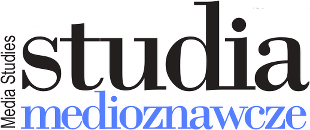The use of news media in political discussions on Facebook
Paweł Matuszewski
(Zakład Socjologii Polityki w Instytucie Politologii Uniwersytetu Kardynała Stefana Wyszyńskiego w Warszawie/Department of Sociology of Politics, Institute of Political Science, Cardinal Stefan Wyszyński University in Warsaw)
![]() Pełny tekst artykułu
Pełny tekst artykułu
![]() English version of the article
English version of the article
This article aims to show how the users of Facebook use the news media in the internet discussions. According to the main hypothesis, fan pages’ members prefer the information published by the media ideologically close to their parties, and discriminate the others. However, the research material (c.a. 36.5 thousand links to news media which fans used since September 2015 to February 2017) suggest that on political fan pages, users refer to a variety of sources.
KEYWORDS
echo chambers, filtering bubbles, Facebook, news media, fan pages, belief polarization
BIBLIOGRAPHY
- Allcott H., Gentzkow M., Social media and fake news in the 2016 election, Working Paper No. 23089, National Bureau of Economic Research 2017.
- Barberá P., Birds of the same feather tweet together: bayesian ideal point estimation using Twitter Data, „Political Analysis” 2015, nr 1 (23).
- Barberá P., Jost J.T., Nagler J., Tucker J.A., Bonneau R., Tweeting from left to right is online political communication more than an echo chamber?, „Psychological Science” 2015.
- The SAGE handbook of social media, red. J. Burgess, A.E. Marwick, T. Poell, Thousand Oaks 2017.
- Canon L., Self-confidence and selective exposure to information [w:] Conflict, decision, and dissonance, red. L. Festinger, Stanford 1964, s. 83–96.
- Dandekar P., Goel A., Lee D.T., Biased assimilation, homophily, and the dynamics of polarization, „Proceedings of the National Academy of Sciences” 2013, nr 15 (110).
- The SAGE handbook of online research methods, red. N.G. Fielding, R.M. Lee, G. Blank, Los Angeles 2016.
- Gantz W., Trenholm S., Why people pass on news: motivations for diffusion, „Journalism Quarterly” 1979, nr 2 (56).
- Gentzkow M., Shapiro J.M., Ideological segregation online and offline, NBER Working Papers No. 15916, National Bureau of Economic Research 2010.
- Knobloch-Westerwick S., Choice and preference in media use: advances in selective exposure theory and research, New York–London 2015.
- Messing S., Westwood S.J., Selective exposure in the age of social media: endorsements trump partisan source affiliation when selecting news online, „Communication Research” 2014, nr 8 (41).
- Sunstein C.R., #Republic: Divided democracy in the age of social media, Princeton 2017.
- Swann W.B., Giuliano T., Confirmatory search strategies in social interaction: how, when, why, and with what consequences, „Journal of Social and Clinical Psychology” 1987, nr 4 (5).
- Vicario M.D. i in. The spreading of misinformation online, „Proceedings of the National Academy of Sciences”, 2016, nr 3 (113).

